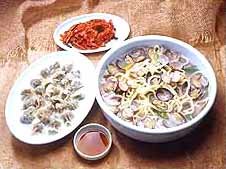`Hwang Kojip Bajirak Noodle`

An elderly man in an old Korean tale was called ``Hwang Kojip`` owing to his stubbornness. ``Kojip`` is Korean for stubbornness. The owner of a restaurant of the same name clings stubbornly to a business strategy based on customer service. The owner`s name is, of course, Hwang.
``Hwang Kojip Pajirak Kalkuksu`` (032-657-3334) in Puchon City, Kyonggi Province specializes in bajirak (short-necked clam) and kalkuksu (thick-cut noodles). The restaurant is stubborn in other ways. It does not offer boiled rice and barley (``poribab``) like other kalkuksu houses but holds fast to serving only two dishes, kalkuksu and boiled dumplings, priced at 4,000 won each.
It also stubbornly refuses to use any other short-necked clams in its kalkuksu than those caught off Anmyon-do Island, South Chungchong Province. Most Koreans take pleasure in shucking the plentiful clams in kalkuksu, eating them one by one and stacking the shells.
The light yellow noodles in the restaurant`s kalkuksu are rich and elastic. Because only pumpkins and green onions are used in the soup, it is never too salty or spicy.
Restaurant owner Hwang Sun-Ok said, ``After kneading the flour by hand, I let it sit at zero degrees Celsius for 10 hours and the noodles become very elastic. In order to prevent them from softening, I do not boil them in advance. I boil the noodles for seven to eight minutes only after taking the customer`s order.``
Many customers also order boiled dumplings as an ``appetizer.`` The dish consists of about twenty dumplings made from ground pork, leek and green bean sprouts. The restaurant seats about 70 and parking is available for 15 cars. It is open year-round except for traditional holidays.
Park Hee-Je min07@donga.com







